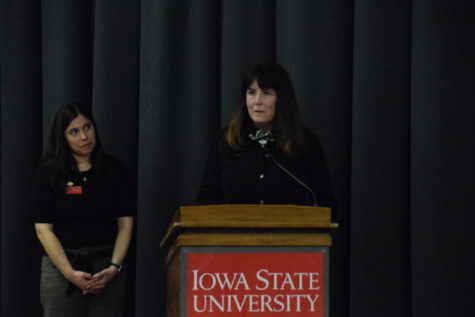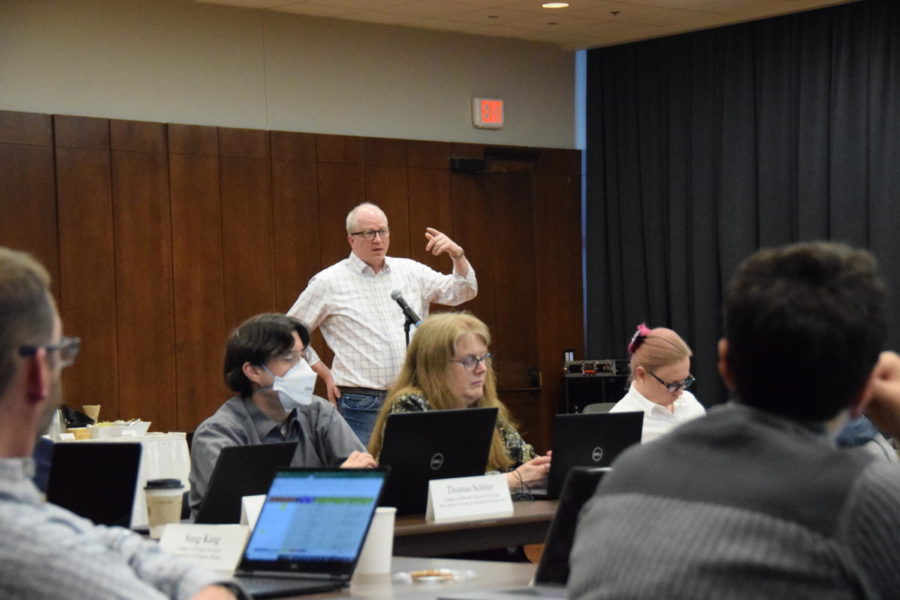Faculty Senate hears reports on new initiatives and technologies
Dave Peterson pictured while asking a question during Ann Marie VanDerZanden’s presentation regarding ChatGPT.
Iowa State’s Faculty Senate heard announcements regarding a new hiring initiative, Iowa’s current legislative session and administrative recommendations regarding ChatGPT during their meeting Tuesday afternoon.
Associate Provost for Faculty, Dawn Bratsch-Prince, told the Senate a new faculty hiring initiative led by herself and the Vice President of Research, Peter Dorhout, would focus on faculty hiring in key areas that integrate with Iowa State’s research strengths, support emerging degree programs and address areas of strategic importance for the university and state.
Bratsch-Prince said they would target areas including climate science and sustainability, cybersecurity, critical materials, human health initiatives and the associated societal impacts of those areas.
“We’re investing $3.5 million of institutional resources in this hiring initiative,” Bratsch-Prince said. “We’ll provide centrally 50% of the base salary and benefits for faculty hired in these areas over the next three years, and then the remainder is covered by the college and or department.”
Bratsch-Prince said at the end of the three-year period, the various colleges and departments will pick up the cost of the new hires. Bratsch-Prince also said the university hopes colleges will consider interdisciplinary approaches and hires between colleges.
“And I know that sometimes when we do things creatively interdisciplinary across colleges, things get complicated, but that’s really where the exciting research, scholarships and programs are for our students,” Bratsch-Prince said.
Bratsch-Prince also told the Senate about the Degrees of the Future Initiative, led by Associate Provost for Academic Programs Ann Marie VanDerZanden, which is intended to help colleges and departments to create innovative new programs.
Bratsch-Prince said the new degree programs could be bachelor’s, master’s or doctoral programs.
“The goal of these new degree programs… is meeting student demand and employer demand, reaching new markets of students, new geographic areas, new demographic markets and attracting students into emerging disciplines,” Bratsch-Prince said.
Bratsch-Prince also touched on Iowa’s current legislative session. Bratsch-Prince said the universities state relations officer, Carolann Jensen, was hard at work at the capitol representing Iowa State and its interests.
Bratsch-Prince also stressed the importance of separating personal and institutional advocacy. Bratsch-Prince asked any faculty members who feel inclined to reach out to legislators and advocate for various issues do so as private citizens rather than as their role on campus.
VanDerZanden spoke to the Senate regarding concerns around ChatGPT. VanDerZanden said the university had assembled a group of faculty members to discuss issues around AI and how to address them in a university setting.
“I know that chat GPT came up on a number of people’s radar in a very visible way at the end of fall semester,” VanDerZanden said. “It is the latest example of AI that is impacting not only higher ed but essentially every sector that we can think of.”
VanDerZanden said the university had identified areas around syllabus recommendations for professors to specify when AI is strictly prohibited, when it can be used and when it is broadly encouraged.
VanDerZanden also said the university is looking into technologies that can be used to detect things generated by AI. Although, she later said the tools used to determine if something was generated by AI are not 100% effective.
“The other recommendations are really focused on the teaching and maybe adapting some of your existing assignments and then also using things that aren’t necessarily things that something like AI can necessarily generate,” VanDerZanden said.
VanDerZanden said this could mean things like in-class debates or creating mindmaps. VanDerZanden pointed out some institutions in Australia require all exams and essays to be written in a blue book, although she also acknowledged that nobody wants to go back to that system.
VanDerZanden also pointed out that European schools are looking towards oral exams and written exams as another means of tackling the issue.
“I fully understand that this is going to be messy,” VanDerZanden said. “As when we have any type of new technology that comes out. There’s always that space that is a little bit difficult. How do we do something with it?”
The Senate held two elections during Tuesday’s meeting. The first was to find a replacement for the Resources, Policies and Allocations (RPA) council chair after associate professor in architecture Mikesch Muecke announced in December he would be resigning from the committee.
Only one senator was nominated for the position, associate professor in electrical and computer engineering, Timothy Bigelow. Bigelow was elected as the new RPA council chair, and will serve through the spring semester before another election is held to select an Resources, Policies and Allocations chair for a full two-year term.
The Senate also voted on the next president-elect. Two senators were nominated for this position, associate teaching professor in human development and family studies, Meghan Gillette and teaching professor in finance, Rahul Parsa.
Each nominee gave a three-minute presentation on why they should be appointed president, after which the Senate voted on their choices. Shortly after, the votes were tallied and Parsa was announced as the next president-elect.

The Senate heard a report from former President and associate professor in architecture, Andrea Wheeler and the Associate Director of Student Services, Adriana Gonzalez on new student success initiatives.
Wheeler said $10.5 million was set aside by Iowa State’s President Wendy Wintersteen to focus on various priorities aligned with the new strategic plan. Some of these priorities include new degrees, enrollment, open-access childcare, lab equipment and seed funding for research.
Wheeler said another priority is retention, with $1.5 million going towards increasing retention and graduate admission rates. Wheeler also said the university wanted to focus on reducing factors that may cause students to drift away from academic affairs.
“Our immediate most pressing concern this semester has been those students most impacted by the pandemic and to help those students, funding has been provided to the Academic Success Center for additional tutoring and supplementary instruction,” Wheeler said.
Gonzalez spoke on the Academic Success Center and some of the programs taking place through it. Gonzalez said the Academic Success Center increased the wages of tutors to encourage more students to sign up for tutoring. Gonzalez also said the center was focusing on increasing the prevalence of supplemental instruction, pointing out that it has a tangible impact on students’ GPAs.
Gonzalez told the Senate about the new Academic Success Navigator unit, which she described as an intake, which would help connect students with the resources they need.
“My hope is that this alleviates the burden on campus to know the ins and outs of our services,” Gonzalez said. “And instead, the only expectation is that folks who are meeting with a student who maybe is unsure of what support they need, or where to even begin can be referred to this intake wing.”
Gonzalez said many students believe tutoring is the best fit for them in terms of academic support when instead, it is often time management skills and study habits that students are not grasping.
The Senate also approved three new degrees:
- Bachelor’s in Agricultural Communications
- Professional Master’s in Business Administration
- Master’s in Accounting Analytics
The Senate approved a policy change in the language surrounding degree planning and credit requirements for students’ minors. Some faculty raised concerns that credit requirements were exceptionally low for minors, although associate professor in food science and human nutrition, Terri Boylston pointed out that while the technical requirements were low, students would still likely need to take a number of courses before qualifying for their minor.
Your donation will support the student journalists of the Iowa State Daily. Your contribution will allow us to purchase equipment, send our student journalists to conferences and off-set their cost of living so they can continue to do best-in-the-nation work at the Iowa State Daily.













